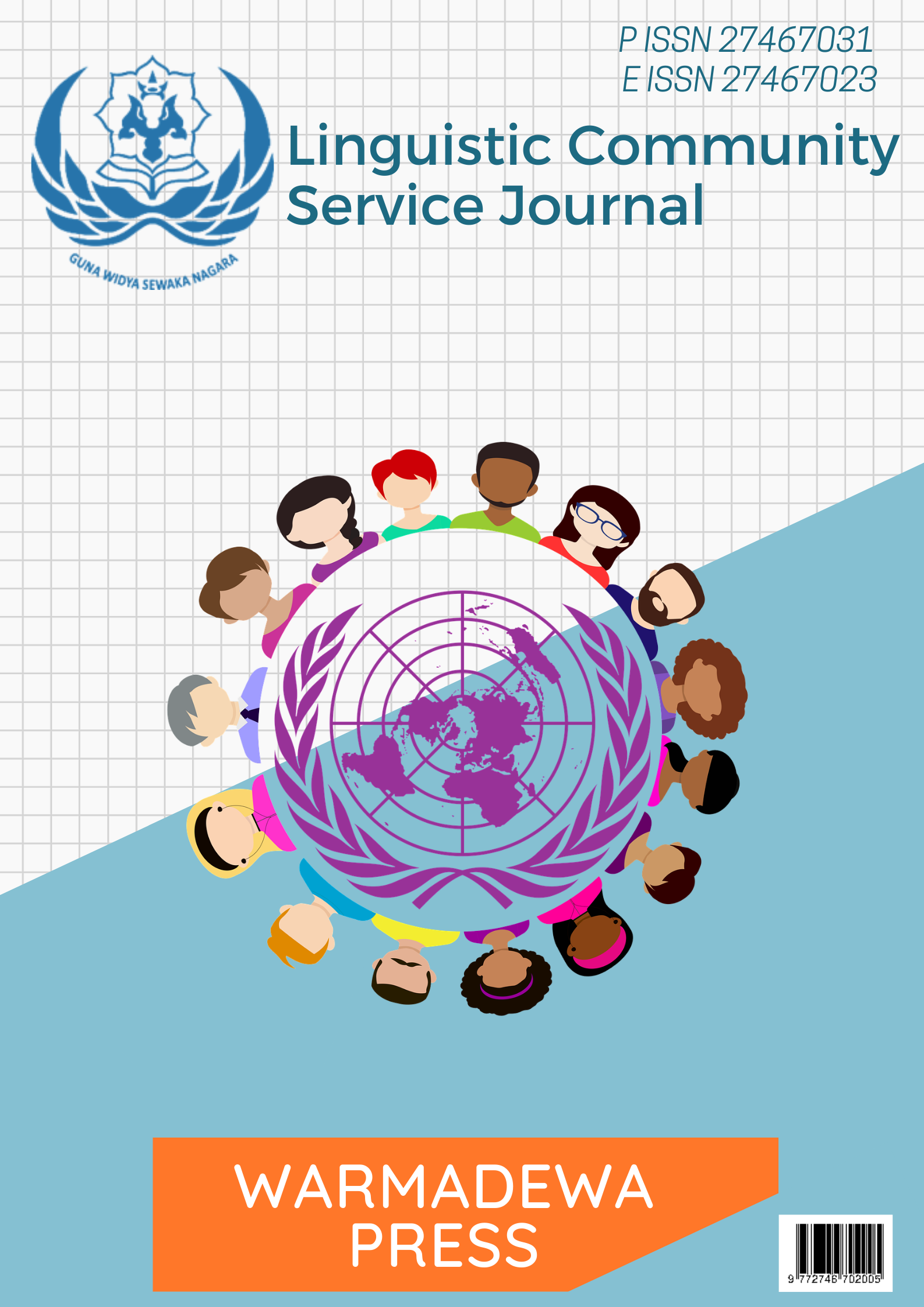Konservasi Ekoleksikon Pada Tradisi Mekare-Kare
Abstract
The procession of implementing the mekare-kare tradition consists of nyikat, ngastiti, sabetan pandan, mecane, meboreh, and megibung. In carrying out each of these processions, the community uses several traditional tools and wears distinctive traditional clothes. The naming of each entity in this tradition represents the lexicon of flora and fauna and the formation of relationships between language, humans and the environment. This activity is carried out to conserve the ecolexicon on Mekare-kare tradition. The method used to collect data is to refer to the note-taking technique. The results showed that ecolexic treasures such as traditional swing, white thread, boreh curry, baas, balai patemu kelod, don pandan madui, gantih nyoman, gedong patemu, woven pegringsingan, kamen, nyikat, ngastiti, mecane, maboreh, magibung, saput, tamiang, tuak, tiing, and udeng. This ecolexicon is in the form of root words, affix words, and compound words which are categorized as nouns and verbs. In terms of meaning, this ecolexicon contains both lexical and cultural meanings. Then, the ideological dimension refers to the use of Balinese and several terms with certain concepts in the mekare-kare tradition by every member of the Tenganan Traditional Village community. The sociological dimension refers to the community interacting and communicating using the Balinese dialect of Tenganan in a series of implementation of the mekare-kare tradition. Meanwhile, the biological dimension can be seen from every community in the Traditional Village of Tenganan who utilizes the potential of flora (plants) and some abiotic elements to make the facilities used in the mekare-kare tradition.
References
Abdullah, Wakit. (2014). Etnolinguistik: Teori, Metode, dan Aplikasinya. Solo: UNS Press.
Bang, J.Chr. dan Door, J. (2000). EcoLinguistics: A Framework.
Chaer, A. (2012). Linguistik Umum. Jakarta: Rineka Cipta.
Chaer, Abdul. 2009. Pengantar Semantik Bahasa Indonesia. Jakarta: Rineka Cipta.
Darmana, K. (2017). “Mekare-Kare†Wujud Ritualitas Keagamaan Desa Adat Tenganan Pegringsingan Sebagai Obyek Wisata dan Dampaknya Terhadap Kehidupan Masyarakat, Karangasem, Bali. Sunari Penjor Journal of Antropology, vol. 1 (1), hal. 1-12.
Kridalaksana, H. (1994). Kelas Kata dalam Bahasa Indonesia. Jakarta: Gramedia.
Mbete, A. M. (2013). Penuntun Singkat Penulisan Proposal Penelitian Ekolinguistik. Denpasar: Vidia
Syahrani, A., Karman, & Patriantoro. (2019). Khazanah Leksikon Dalam Ritual Tekao Pada Masyarakat Dayak Bakatik Kamayo di Kabupaten Bengkayang.
Steffensen, Sune Vork. (2007). Ecology and Society: An Introduction to Dialectical. London: Continuum.
Yanuarta, I. W. A. (2018). Tradisi Mekare-Kare di Desa Bali Aga Tenganan Pegringsingan Dalam Fotografi Dokumenter. Yogyakarta: Fakultas Seni Media Rekam Institut Seni Indonesia. Jurnal Pendidikan Dan Pembelajaran Khatulistiwa, vol. 8 (9), hal. 1-12.
Ani Studio Production. (Diakses pada 28 Maret 2021). https://www.youtube.com/watch?v=RPRhI37PNYE&t=19s “Perang Pandan (Tenganan Pegringsingan
Festival)â€. Bali Warna. (Diakses pada 29 Maret 2021). https://www.youtube.com/watch?v=YJdDH2oL6bA&t=195s “Mengenal lebih dekat Tradisi Perang
Pandan di Desa Tenganan Pegringsinganâ€. Info Denpasar. (Diakses pada 30 Maret 2021). https://www.youtube.com/watch?v=efme7wBbTXM&t=73s “Mekare-kareâ€. Bali Life Island. (Diakses pada 30 Maret 2021).
http://tourism.karangasemkab.go.id/wisata/mekare-kare-desa-tenganan-pegringsingan/ (Diakses pada 27 Maret 2021).
https://www.balitoursclub.net/tradisi-mekare-kare-di-tenganan/ (Diakses pada 27 Maret 2021).
https://dapobas.kemdikbud.go.id/ (Diakses pada 27 Maret 2021). https://www.youtube.com/watch?v=46x-OeQQMfw “Perang Pandan (Mekare-kare)â€
Copyright (c) 2021 Linguistic Community Services Journal

This work is licensed under a Creative Commons Attribution-ShareAlike 4.0 International License.
This journal provides immediate open access to its content on the principle that making research freely available to the public supports a greater global exchange of knowledge.
All articles published Open Access will be immediately and permanently free for everyone to read and download. We are continuously working with our author communities to select the best choice of license options, currently being defined for this journal as follows: Creative Commons-Non Ceomercial-Attribution-ShareAlike (CC BY-NC-SA)
 Abstract viewed = 261 times
Abstract viewed = 261 times
 PDF (Bahasa Indonesia) downloaded = 342 times
PDF (Bahasa Indonesia) downloaded = 342 times














